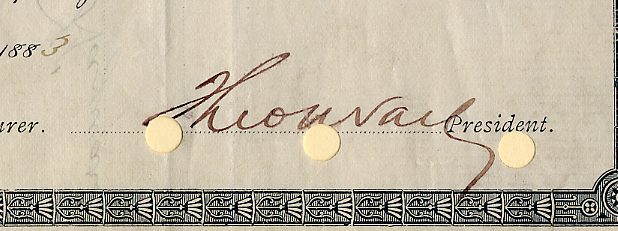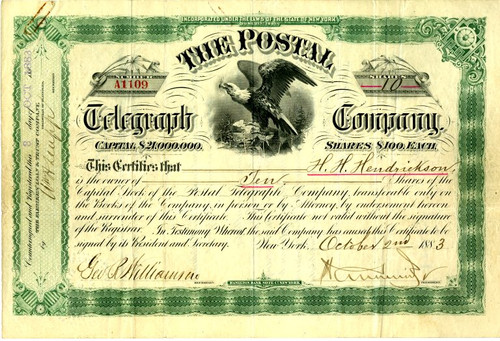Historic Stock certificate from the New England Telephone & Telegraph Company issued in 1883. This early Bell Operating Company Stock Certificate was has an ornate border around it with the company's name on top center. This item has the signatures of the Company's President, Theodore Vail and Treasurer, William R. Driver. This is the first Telephone Company certificate we have seen hand signed by Theodore Vail. 
Theodore Vail's Signature New England Telephone & Telegraph Company was chartered on October 19,1883 under the laws of New York State. It consolidated the Telephone Dispatch Company, the National Bell Telephone Company of Maine, the Boston and Northern Telephone Company, The Granite State Telephone Company and the Bay State and Suburban Telephone Company. Bell operating companies in Southeastern Massachusetts, Rhode Island and Connecticut were not included. The New England Telephone and Telegraph Company, more commonly known as New England Telephone, was a Bell Operating Company that served most of New England as a part of the original AT&T for seven decades, from the creation of the national monopoly in 1907 until January 1, 1984, when AT&T was divested of its local operating companies. It became part of NYNEX on that date, and from 1994 the name was no longer officially publicly used (although it was still used internally for portions of operations). Through a variety of mergers and acquisitions its operations were successively part of NYNEX, Bell Atlantic, and Verizon. As of April 1, 2008, its operations in the three northern New England states were sold to FairPoint Communications under the operation of Northern New England Telephone Operations. Operations in southern New England remain with Verizon. "Alexander Graham Bell invented the telephone and Theodore Vail invented the telephone business." Theodore Newton Vail (July 16, 1845 April 16, 1920) was a U.S. telephone industrialist. Born in Minerva, Ohio, he served as the president of AT&T between 1885 and 1889, and again from 1907 to 1919 (the company was named American Telephone & Telegraph before 1894). He convinced President Woodrow Wilson that the telephone as a medium of communication would spread more rapidly if it was brought under one monopoly so as to ensure uniform provision of services throughout the country. He called this "one system, one policy, universal service". At age forty, Vail resigned as General Manager of American Bell to become the first President of AT&T. Theodore Vail had the philosophy that customer service--not increasing dividends--was the most important thing to a corporation. His policy and vision was always larger than current minds. Universal service and commitment to the customer were his policies. AT&T was almost certainly the first large private organization to adopt a conscious, clearly articulated policy of subordinating the maximization of profit to the provision of service, a milestone in industrial history. Two years later he resigned from AT&T because of escalating disagreements over service improvements versus short-term financial gain. Vail was unable to convince his Board of the value of "service first." Twenty years later, Vail was asked to return as President. During his hiatus, he had developed electricity from waterpower in South America, financed a gold mine in Colorado and invested in electric tramlines. Vail had left the company in its youth; he now found a great and wallowing giant, needing to be set on its feet. During his absence, the company's directors had viewed their mission as being to milk the Bell Patents for all they were worth until their expiration. The attitude had become one of an elitist monopoly doing the public a favor. When the patents expired and the Bell Company was no longer a monopoly, the trouble really started. "Independent" companies (those in smaller towns and on farmer's lines where the Bell company had no service) were now able to compete directly in those areas where Bell had held a monopoly. This ushered in a confusing, chaotic era of two or even three companies in the same area. In order for customers to speak to all others in their own town, it was often necessary to have 2 or three separate telephones and lines. Because of their cavalier attitude, Bell was not always the favorite company among these customers. They were beginning to lose ground. Vail was just the man to help AT&T make the necessary hard decisions and to begin to turn the company around. The first thing they needed was a clear sense of purpose and mission. He set about implementing his strategy to achieve a single communication system offering the best possible service. He put an end to the harassment of the independent telephone companies and made it attractive for them to link up with Bell. He put new emphasis on centralized control and standardization of apparatus, equipment and operating methods. He announced the policy of candor and cooperation with government regulatory efforts, determined that the telephone system should remain in private hands. Finally, he established a firm financial foundation for growth, by raising millions of dollars and redesigning the AT&T stock offerings to appeal to investors interested in steady income and growth. He undertook a vigorous campaign of public relations, and was responsible for the motto, "One policy, one system, and universal service." He began advertising the story of the Bell System as an institution representative of American life and the American Dream. In June of 1919, he retired as President and became Chairman of the Board. Vail was 74 years old when he died on April 16, 1920 at Johns Hopkins Hospital in Baltimore. The Vail medal was established in his memory in 1921, to award employees "in recognition of unusual acts or services, which conspicuously illustrate the high ideals which governed the policy of Mr. Vail." Vail's legacy Some of Vail's most important actions were: He developed pensions. He secured the company from government control during wartime. He played a large role in the founding of the Telephone Pioneers of America, becoming its first President. He structured operating companies, laying out the geographical boundaries of the Bell Companies. He helped create, and listened in on, the first transcontinental telephone conversation. He was a founder of the Junior Achievement program, that is still teaching our youth how to operate a business. His advice to employees still resonates: No business talk after six o'clock. Tranquil thought is always needed. Refuse to be hurried. Love your work and have pride in it. Be courageous--state both sides of an issue openly. Never let 'em know if you are worried. Service improvements are more important (and lucrative) than short-term gains. If we don't tell the truth about ourselves, no one else will. History from Wikipedia, Telecommunications Virtual Museum and OldCompanyResearch.com (old stock certificate research service).

Theodore Vail's Signature








